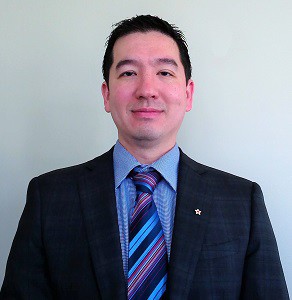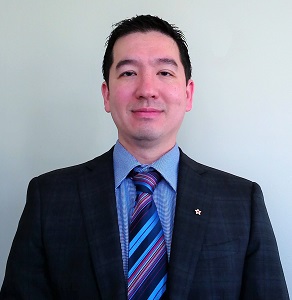As Research Manager and Senior Editor of the Conference of Defence Associations Institute, Dr. David McDonough gets to write his fair share of blog posts and op-ed pieces. However, his main responsibility is to the lead in developing the institute’s research, analysis and publications output which are aimed at promoting informed public debate on national security and defence issues.
In his recent interview with Vanguard, David talked about the thinks that inspire him and how the Institute is changing the game in its sector.

Vanguard Magazine: How did you start out in the industry and how has it brought you to where you are today?
David McDonough: I am an academic by training, meaning that I finished by Ph.D. at Dalhousie University and undertook two years as an SSHRC-funded, post-doctoral scholar at two different universities. But I would actually say that my start in the industry – and this industry would be the broader security and defence community – actually originated even before my doctoral studies. Specifically, following my MA at UBC, I became the Research Officer at the now defunct Canadian Institute for Strategic Studies, funded by the (also defunct) Security and Defence Forum Internship.
Since then, I’ve had a variety of positions at different Canadian and UK think tanks, in academia as a doctoral and post-doctoral scholar, and now at my present position at the CDA Institute. It has combined a variety of academic pursuits, such as writing articles, papers, op-eds, and blog posts, as well as more think tank-related activities from publication coordination and management to editing. And both sides have been evident in my career.
VM: What is your role in your organization today?
DM: My current position is Research Manager and Senior Editor at the CDA Institute. This does not mean that I am a researcher per se, although I have used the opportunity to write occasional blog posts, op-eds, and even a peer-reviewed Vimy Paper over the past year, based on my own interest and discretion. Instead, my main role is as the person who takes the lead in the development of the Institute’s research, analysis, and publications output, whether by growing our incipient Fellowship Program, serving as the main editor of our publications and blog, or otherwise providing direction to our research activities. As such, I oversee an important element of the organization’s raison d’etre – the other being our event programming, which is in the capable hands of our Program Manager Denise Lemay.
VM: What was your worst moment?
DM: I’d have to go back to the period near the end of my two-year Post-Doctoral Fellowship, as my fellowship contract was coming to an end at that time and I was left scrambling to ultimately figure out what my next step would be. My own interest in a straightforward academic career had by then ebbed, which only made things even more difficult.
VM:What was your A-HA moment or epiphany?
DM: I’d have to say the realization in the middle of my doctoral studies that I didn’t want to be a professor or academic – an epiphany that was based less on career prospects of ending up a tenure-track professor (which incidentally were dismal) and much more a matter of personal choice on what I really wanted to do with my life.
I had started my doctoral studies partly, at the risk of sounding arrogant, because I was so very good at it, especially from a research and publication perspective, where I collected national-level awards and published a significant body of peer-reviewed journal articles, papers, and book chapters – in Canada, the United States, and the UK – over a decade. But then I discovered that I had been focused far too much on process, which I truly enjoyed, and much less on the end goal of gaining my Ph.D. The end goal for most people undertaking doctoral work is becoming a professor, whether due to the path-dependent process of a Ph.D. or due to years of academic socialization and to depart from that is not necessarily an easy process.
The result of this epiphany was a re-evaluation of my career itself – a re-evaluation that continued for the duration of my Ph.D., for my two years as a post-doctoral scholar, and ultimately led me to my current position at the CDA Institute, and will undoubtedly affect me in my future steps of my career.
VM: Step back and analyze your journey – what is the takeaway you want to give our audience?
DM: I’d say a career may not be linear; it can ebb and flow based not only on the nature of the job market itself but also from internal considerations and self-evaluation. The important thing is to enjoy what you do and be prepared to change course if you must do so, recognizing that sometimes mistakes can happen in one’s choices, both career and personal. Changing course and pivoting may not be easy, like many things in life, but it may be necessary.
VM: What is the one thing that has you most fired up today?
DM: I would have to say the Defence Policy Review, which has at least created the possibility of an open process where public input may not only be welcomed but could have an impact on Canadian defence policy – although whether this is a real possibility or simply an appearance of one remains to be seen. Irrespective, given how long it has been since the last defence review, it has certainly created a degree of excitement from both a personal level and from an institutional level, here at the CDA and CDA Institute. It has certainly inspired me to write a number of op-eds offering thoughts about defence policy, as well as a recent Vimy Paper where I finally had a chance to put my own thoughts on Canada’s possible role in BMD to paper.
VM: What is the best advice you received?
DM: I’d have to say that the smartest person can be completely wrong, and the dumbest person can be completely right. I don’t recall who said it to me, and I doubt it’s their exact words. But, ultimately, such a view helps to mitigate personal arrogance – always a dangerous characteristic in academia – and helps inculcate an openness to advice and input from a variety of people.
VM: What is a habit that contributes to your success?
DM: I’d say being willing to roll up your sleeves to get things done, and being proactive about what one does. I’d also say being with hard- working, astute, and amicable co-workers, as we’re rarely alone in our success and sometimes it’s actually a group that achieves success rather than the individual. In that sense, I feel very luck at the CDA Institute.
VM: What people or organization best embodies the innovation mindset?
DM: I’d actually go back to my old doctoral supervisor Frank Harvey. It’s less about his numerous awards, extensive publications, and broad recognition and respect amongst the academic security and defence community. It’s much more to do with the high quality of his writings and the degree to which he can provide very counter-intuitive stances, positions, and arguments in them – ones that often challenge the conventional wisdom, and which even if I do not necessarily agree with are still thought-provoking, logical, and impossible to ignore. I can think of few security and defence-focused academics who are as astute and innovative in Canada today, and I still feel grateful for having had the opportunity to study under him – even if my own path has led me to become something of a recovering academic, so to speak.
Questions about CDA Institute
VM: How is your organization changing the game in your industry sector?
DM: The CDA and CDA Institute have a long-standing and well-respected role in Canada’s security and defence landscape. Yet, with a transition to a new Executive Director (now Chief Executive Officer) and new staff, it does create an important opportunity for innovation and re-assessment on how things are done– something we have undertaken, whether by revamping our publication, placing greater emphasis on website content through our Blog, getting a more varied number of authors (from Canada and abroad) for our publications, thereby better ensuring that we represent a diversity of viewpoints in accordance with the Institute’s educational mandate. Innovation is also readily apparent in other areas, including through our wide-ranging (and still ongoing) Governance Review and rethinking the location of and ultimately how we do our event programming, and re-energizing the Regular Member and Associate Member Associations of the CDA.
Change is never easy, and sometimes innovative measures need to be re-adjusted based on feedback and advice. But I do not doubt that sometimes change is necessary, not least if the CDA and CDA Institute wish to remain leaders in the security and defence realm. The focus must continue to be relevance and high-level content.
VM:What are some of the biggest impediments to innovation in your organization or industry sector?
DM: I would say perhaps the biggest impediment to innovation for any organization is its own history and its past successes. Ironically, there is no doubt that in our case the greatest strength of the CDA and the CDA Institute is our history – especially if you take into account the nearly 90-year existence of the parent organization, the CDA – but this is also a factor that can make innovation particularly challenging. Some would say: Why tinker with a good thing? And this is an important question. The other question would be: How do we build on our successes and take advantage of new and innovative opportunities to bring the organization to new heights or prepare it for greater relevance and longevity? A major problem is undoubtedly financial, in so far as it invariably requires financial resources to maximize the benefits of innovation. That actually points to a larger problem with the industry sector (by which I mean the ‘think-tank’ community) in Canada. Financial resources for this sector are highly limited, especially compared to the think-tank communities in the US, UK, and Australia, where they benefit from much greater private, corporate and government resources and internal capacity.
VM: How has innovation become ingrained in your organization’s culture and how is it being optimized?
DM: Innovation has become better ingrained partly due to the staff transition, which has opened up new avenues, ideas, and opportunities in how to approach all our activities, as well as through the ongoing Governance Review, which has helped to streamline the governance arrangements of the CDA Institute and made it more amenable to innovation.
VM: What technologies, business models, and trends will drive the biggest change in your industry for the next two years?
DM: I would say the openness of the new government to input from the ‘think-tank’ community, which will have a driving effect on what research, publication, and event output organizations like the CDA Institute will undertake over the next two years. Another trend is the growing number of think-tanks undertaking activities on security and defence issues, at a time when there is some donor/sponsor fatigue, which will make it a more competitive environment for both event participation and private donor-corporate sponsorship.
Of course, I do not doubt that organizations like the CDA and CDA Institute will continue to do well, due not only to their venerable history and in-depth knowledge and expertise on security and defence issues, but also their willingness to adapt, innovate, and re-evaluate their activities and business model on a regular basis. All this while protecting their credibility, core content and signature output.

